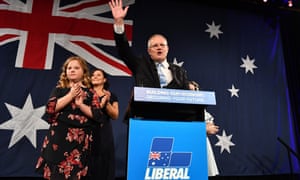Research finds a quarter of people voted for different party than one they supported month before election
A late surge of undecided and minor-party voters deciding to back the
Coalition and people who had intended to vote Labor rejecting Bill Shorten were two of the major causes of Scott Morrison’s upset election win in May, according to a new study.
The research from the Australian National University, released on Tuesday, found that more than one quarter of people voted for a different party than the one they’d indicated an intention to support just a month out from the election, explaining the result the polls failed to predict.
The research by associate professor Nicholas Biddle found that vote switchers who delivered victory to the Coalition were more likely to be older, women, non-Indigenous, non-university educated and living outside the most disadvantage areas in Australia.
“These individuals also tended to be less supportive of population growth,” he said.
By comparing how a sample of 1,844 voters said they planned to vote
in April with how they reported they had voted in June, the survey
revealed the Coalition grew its vote by 7.2%, while Labor had no real
change, the Greens went backwards by 2.6% and other parties lost a “very
large” net flow of 42% of their intending voters.The research from the Australian National University, released on Tuesday, found that more than one quarter of people voted for a different party than the one they’d indicated an intention to support just a month out from the election, explaining the result the polls failed to predict.
The research by associate professor Nicholas Biddle found that vote switchers who delivered victory to the Coalition were more likely to be older, women, non-Indigenous, non-university educated and living outside the most disadvantage areas in Australia.
“These individuals also tended to be less supportive of population growth,” he said.
Among all people who changed their vote, the most common reason was that their view of their local candidate had changed.
But for former Labor voters, the most common reason for abandoning the party was that their view of Bill Shorten had changed, cited by 27.7% compared with just 14.8% of former Coalition voters.
Labor appears to have won back some votes on policy, with 20.7% of former Coalition voters giving this as one of their reasons for change, compared with 11.9% of former Labor voters.
“Collectively, these findings confirm some of the speculation on the May election,” it said. “First, it was views on the opposition rather than views on the government that were most salient for those who changed their vote.
“Second, the opposition leader [Bill Shorten] pushed more people away from Labor between April and the election than drew people towards Labor.”
The research found that people who were more willing to take risks were less likely to have voted for the Coalition, while there was a “very strong association between willingness to take risks and a swing towards Labor”.
It said this was “not surprising” in the context of an election in which the Coalition focused on changes to the tax system while Labor “had a number of policy proposals, some of which could have been of concern for those who were relatively risk averse”.
The research found that half of minor-party voters in April and almost half of undecided voters (47.6%) had said in November they would vote for the Coalition.
It concluded the election was “partly a story of people leaving the Coalition between November and April, and returning during the election campaign”.
Biddle said the results prove who a person says they’ll vote for on a particular day is far from a perfect predictor of who they’ll end up voting for, meaning “more care and transparency” is needed in examining how polling is adjusted.
“In the end, polls are just sample surveys, often undertaken on a small percentage of the population,” he said.
“There’s a considerable skill and science around turning that into something more meaningful. Election polls tend to get pretty close but, like any survey, are prone to errors.”
At the 2019 election the vote of minor parties and independents reached a new record, with almost a quarter (24.7%) of first-preference lower house votes going against the major parties.
The first Essential poll after the election found that late undecided voters propelled Morrison to victory with 40% of people who made up their minds in the closing week backing the Coalition, compared with 31% for Labor, while the Coalition won an 11% margin among those who decided on the day.
According to a Guardian Australia analysis, electorates that swung harder to the Liberal and National parties were more likely to have higher unemployment, lower income, lower levels of education and fewer migrants.

No comments:
Post a Comment